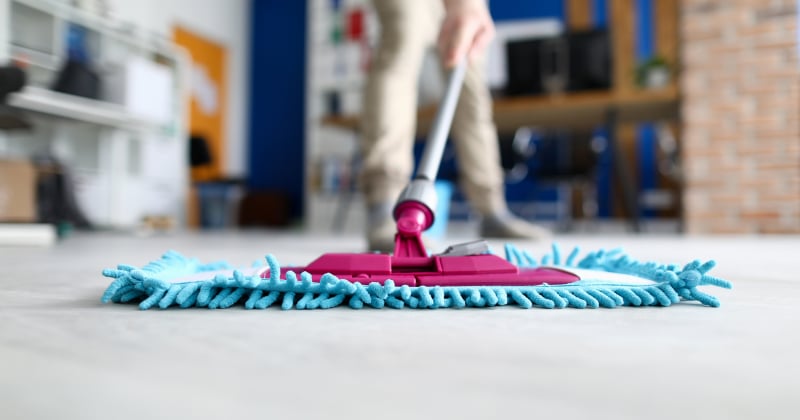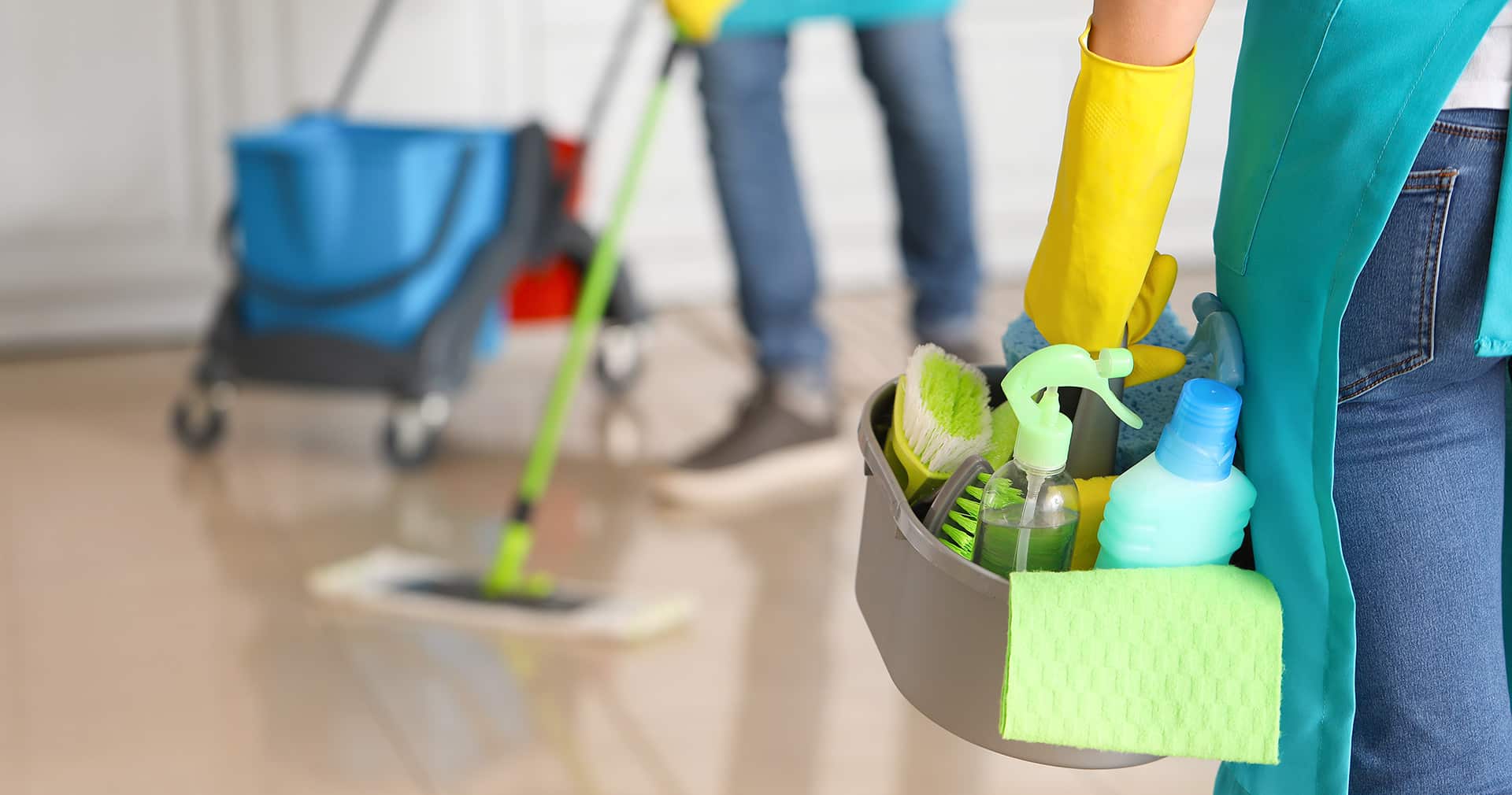How to Start a Cleaning Business: The Checklist
If it’s the cleaning industry you hope to enter, you’ve come to the right place. Here, you will find the critical information you need to build a robust cleaning business and launch strategy.

Staff Contributor
Starting a business can be exciting and daunting at the same time. You’re investing your time, money, and resources, and you’re willing to do whatever it takes to transform your idea into a success story.
If it’s the cleaning industry you hope to enter, you’ve come to the right place. Here, you will find the critical information you need to build a robust business and launch strategy. We’ll start by exploring what a cleaning business is and the various niches you can serve. Then, we’ll look at why now is the ideal time to start a cleaning business. Finally, we’ll walk you through the six steps to launching a new cleaning company.
For your convenience, we’ve also put all this information in a handy Starting a Cleaning Business Checklist that you can download—here or at the end of the article. Let’s dive in.
What Is a Cleaning Company?
Before you start your own cleaning company, you need to understand the undertaking you’re about to tackle.
A cleaning company is a type of service provider that offers cleaning solutions for a broad spectrum of clients. Some of the niche businesses you’ll find in the cleaning service industry include:
- Residential Cleaning Services (also known as home cleaning services) – These businesses send cleaners to private residential properties, such as houses and apartments, to provide a general cleaning service.
- Commercial Cleaning Services – These companies send cleaners to commercial buildings, such as restaurants, office buildings, and retail shops.
- Carpet Cleaning Services – These cleaning companies have special carpet cleaning equipment used by trained professionals to clean carpets, rugs, and sometimes upholstery in residential and commercial settings.
- Window Cleaning Services – These businesses exclusively clean windows in residential and commercial properties. Some window cleaning companies specialize in high-rise window cleaning, which requires specific equipment and training.
Services Offered by Residential Cleaning Businesses
If you’re trying to start a cleaning business from scratch, the residential sector is going to be your best bet. The residential cleaning industry is easier to break into than the commercial industry, which is dominated by large companies with many resources and a lot of staff.
Residential cleaning companies typically offer some or all of the following services:
- One-Off Deep Cleaning—A comprehensive cleaning service that tidies every corner of the home. Generally, clients choose this type of cleaning as a one-off service or for a seasonal refresh. Many cleaning businesses also require clients to buy a deep clean before their recurring service can begin.
- Recurring Cleaning—A general cleaning that occurs at regular intervals, such as weekly or monthly.
- Vacation Rental Cleaning—A general cleaning of a vacation rental between guest stays. This might also include laundry services.
- Empty Home Cleaning—A thorough cleaning of a vacant home between residents after the sale of a property. This is generally the most involved and, thus, most expensive service a residential cleaning company offers.
- Green Cleaning—A ‘green’ cleaning service uses only environmentally friendly or non-toxic cleaning products.

Why Now Is the Perfect Time to Start a Cleaning Business
Cleaning is not a nice-to-have service for property owners—it’s an essential aspect of a healthy and well-functioning home or commercial building. For that reason, cleaning companies will always be in demand, and if you can offer more value than your competitors, your business will thrive.
Not to mention, the COVID-19 pandemic has altered our collective standard of cleanliness. During the early days of the pandemic, excessive cleaning took hold in public spaces, homes, and businesses. As a result, we became accustomed to a certain level of hygiene, and now, we want to maintain that same clean feeling.
At the same time, people are returning to their regular activities. Busy schedules are back with everyone heading back to the office, meeting with friends, and returning to hobbies. Most homeowners no longer have the time they need to make their homes as clean as they were during lockdowns. So, they’re turning to professional cleaners.
This has resulted in what Melissa Hockstad, CEO of the American Cleaning Institute (ACI), calls a “once-in-a-century type of market.” You have the opportunity to make the most of this industry growth—all you need is a trusted resource to follow, which brings us to our next section.
How to Start a Cleaning Business from Scratch
Launching a cleaning business is a big project, one that requires strategy and organization. To help you on your journey to business ownership, we’ve broken down the process into six steps:
- Research the market
- Calculate startup costs
- Choose your name and brand identity
- Sort out the legal side
- Buy your supplies
- Attract clients
Let’s explore each of these in more detail.
Step 1: Research the market.
Before you invest a dollar in your new cleaning business, you must research your local market. Your success depends on the value you can offer your customers, so it’s imperative that your company solves a problem—and solves it better than your competitors.
As you’re diving into your market research, consider the following questions:
- Are there cleaning companies operating in your area?
- Are their offerings niche or specialized in any way?
- Are there any gaps in what they offer (e.g., access to new cleaning technology or use of eco-friendly products)?
- What specific services do they offer, and how much do they charge?
- Are client reviews generally positive or negative?
Using these questions as a start, you can begin to map out some of the basics of your cleaning business, including:
Will you serve the residential or commercial market?
The residential cleaning market generally has more competition but is easier to enter. You can complete most jobs with standard equipment and cleaning products.
The commercial cleaning market, on the other hand, tends to be less competitive. However, breaking into the market is tougher, as it often requires specific equipment and products. Purchasing these supplies and learning how to use them takes time and resources, but commercial clients generally pay more for their cleaning services.
Ultimately, you’ll need to weigh the pros and cons of both markets and determine which one is the best fit for your long-term business goals.
What niche will you offer within the residential or commercial market?
Determining your unique selling proposition (USP) in the early stages of your business journey is key. You might offer a budget cleaning service, a unique subscription model, or use toxin-free products.
Whatever you choose, this niche must inform your branding and be clearly communicated to your customers.
Step 2: Calculate startup costs.
Financing hurdles are one of the top reasons new businesses fail. So, the more insight you have into the actual cost of starting a cleaning business, the better.
The startup costs of launching a cleaning business include the following:
- Registration and insurance costs
- Supplies and equipment (consider your expected workload when calculating the cost of supplies)
- Transportation
- Employees (according to Indeed, the average rate for a cleaner in the United States is around $15 per hour)
- Promotional materials, such as flyers and business cards
- Digital assets, such as your website, social media accounts (although free, you may wish to outsource your social media management), booking software, and accounting software
- Paid advertising, both digital and print
- Emergency fund
Before you create a budget, determine which expenses are fixed and which are variable. Fixed expenses are set in stone and include things like your registration, insurance, and transportation costs.
Variable costs are more flexible and include things like your website, advertising costs, and the number of employees. So, if your budget is tight, you can adjust your variable expenses. For example, you might opt for a DIY website instead of working with a web designer in the beginning.
If you can’t handle the costs of starting your cleaning business on your own, you may need to find extra financing. You can approach friends and family for a startup loan or look to other lenders like your bank.
Step 3: Choose your name and brand identity.
Authentic branding matters, regardless of your industry. In fact, research shows that 86% of consumers consider authenticity to be important when choosing brands to like and support. Your branding—your business’s name, colors, and logo—will be your first impression on many potential clients, so make it count.
Your name should be memorable and unique. Before committing to a name, check if the business name, the domain name, and social media handles are available. If not, you may have to change the name slightly.
Your brand’s colors and logo should look sleek, professional, and reliable. Customers should be able to determine whether your business can best solve their problem right away. With that in mind, you may also want to communicate your unique selling point through word and color choice.
Step 4: Sort out the legal side.
Branding your business can be a fun and exciting experience. Sorting out the legal side, on the other hand, not so much. There are several important stages of this step, which we’ll look at one by one.
A quick disclaimer: You may want to contact a business lawyer who can provide qualified and personalized advice.
Decide on the right company structure and register your business
There are four main company structures to consider for your startup: partnership, corporation, sole proprietorship, and limited liability company (LLC). Each comes with its own set of advantages and disadvantages, and which is right for your cleaning business will depend on your goals and circumstances.
Navigate licensing requirements
You will need a business license before you can conduct business and get paid in your company’s name. You may need other licenses and permits depending on the type of cleaning you plan to perform and your state or city’s specific regulations.
Obtain an EIN
An Employer Identification Number (EIN) is issued by the Internal Revenue Service (IRS) to businesses in the US. This unique, nine-digit code is used to identify your business. It’s used for tax purposes.
Determine your payroll setup
Even if you are the only employee of your cleaning business in the beginning, that might change one day. So take time to decide how you will manage payroll and pay yourself now and when your business grows.
Take out insurance
You will need some form of insurance to operate your business safely. Most cleaning businesses take out general liability insurance and, if they have employees, workers’ compensation insurance.

Step 5: Buy your supplies.
Your cleaning business needs its own supplies and equipment. Some of the supplies you’ll want to buy before launch include:
- Vacuums
- Mops
- Garbage bags
- Cleaning cloth
- Dusters and dusting cloths
- Scrubbing brushes
- Specialized cleaners, including floor and glass cleaners
- Spray bottles
- Gloves
If you plan to hire employees early on, make sure you have enough supplies to go around.
Along with the list above, you will also need:
- A car with enough space to transport cleaning equipment
- A laptop to manage appointments and other business tasks
- A smartphone to manage appointments, communicate with staff and clients and manage social media (if you plan to use it)
Step 6: Attract clients
You are a legal business owner, your branding is unique, and you have the equipment and supplies needed to deliver top cleaning services. Now, there’s just one missing ingredient: clients.
Here are some ideas that’ll help you win your first few clients:
Put the word out
Tell as many people as possible that you have started a cleaning business. Share the big news with friends and family, your postman, your butcher—everyone. Chances are, someone along the way will need a cleaner or know someone who does, and that’s where you’ll come in.
Advertise in your local area
Cleaning businesses are local businesses, so consider advertising where the people in your community will see it. Investigate TV, newspaper, local social media groups, and even billboard advertising. You could also do a letterbox drop.
Create a referral program
A referral program motivates existing clients to recommend your cleaning business to people they know. For example, you might offer 50% off one cleaning service for every person a client refers to your business.
Leverage digital marketing
What’s the first thing many people do when they need a service? They Google it. Ensuring your business is visible online is therefore critical to your success. Google My Business is essential, as it marks your business on Google Maps and allows happy customers to leave reviews. Social media is another excellent, low-cost tool.
Download Your Starting a Cleaning Business Checklist
Congratulations—now you know how to start a cleaning company! The next step is taking action and transforming your vision into reality. Use our comprehensive checklist to guide you on your pathway to success.
Melissa can masterfully bring to life any form of content, whether it’s a landing page or a guide to befriending gnomes. When she’s not crafting stories, she’s either crocheting, smothering her cats in unwelcome affection, or spending time with her fiancé.


